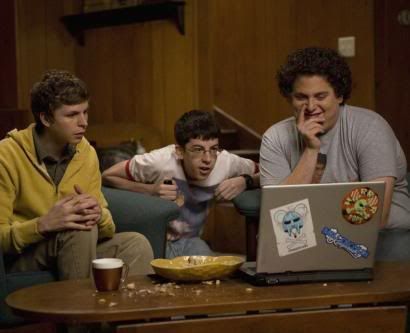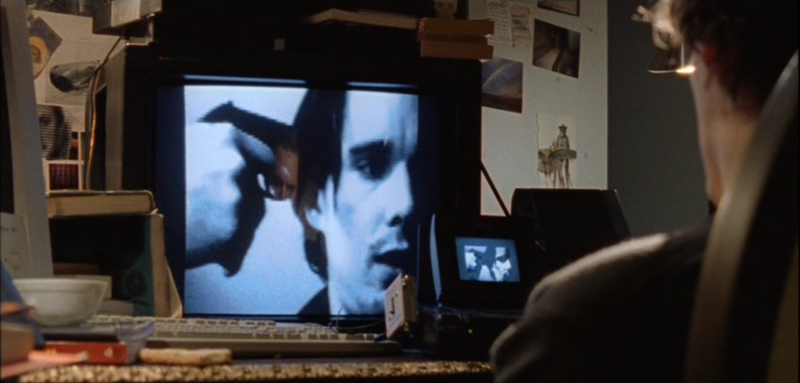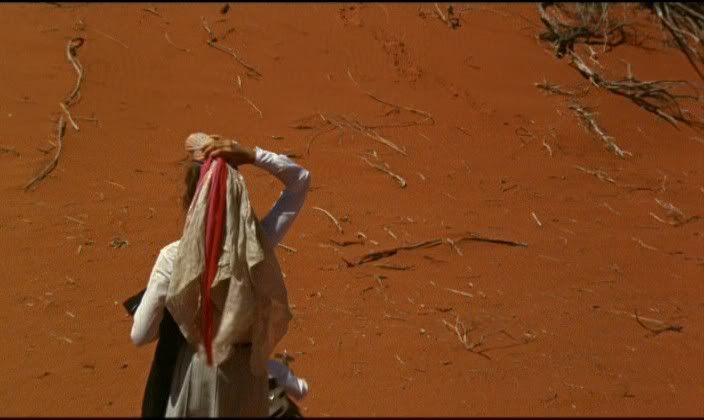Superbad, Hamlet and Walkabout

Superbad, Greg Mottola. [A-] september 9th 2007.
I'd be tempted to call Judd Apatow a one-trick pony if it wasn't for the fact that I find the trick so entertaining and also that the trick is basically just making good movies. As expected, this is another raunchy comedy that, through its raunchiness, honestly depicts and discusses what it's like to be a (male) person. Like the other high-profile Apatowian films of the last few years, it's ceaselessly hysterical and painfully identifiable. If a comparison is necessary, I'll say that I don't think this movie is as good as Knocked Up, but that I probably enjoyed it about as much. Superbad is a little more episodic and set-piece oriented, but I don't really think that's a fault and I think it helps the movie to more eloquently explore the awkwardness of the period it's attempting to document. There's a whole lot of experience and growth to pack into one two hour period and it's pretty unbelievable that this film manages to compress it all as elegantly as it does.
More than anything else, I was surprised by the stuff the writers, Seth Rogen and Evan Goldberg, were able to channel and bring up in this movie. There are a lot of absurd situations that the two main characters, named after the writers, get into in this movie, but there are also frank discussions about friendship, girls and how to hide your boner when you're walking out of class that are totally conversations I have had before as well. I think if you were a sex-obsessed loser in high school this movie will hit you harder. I feel like there's a great deal of courage in the level of self-exposure that the writing of this movie contains, which is ostensibly about fear - of sex, of responsibility, of loneliness. Being able to revisit these awkward years in this confrontationally comedic way was hilarious and therapeutic for me - I can only imagine what seeing this movie will be like for current high school students who are like these characters now.
It's interesting to note that there's a sort of chronological portrait of stunted growth developing from this cycle of films that Apatow has been putting out these last few years. (For the record, I know he didn't direct this, but it's so similar to his other films - and aesthetically it's not unique at all - that I figure I'll credit the man whose sensibility most seems to dictate what this movie is about.) The characters of Superbad, Knocked Up and The 40 Year-Old Virgin are all emotionally and developmentally kind of at the same place at the start of each of these movies - and at the end - but each is devoted to a different age group; Superbad chronicling adolescence, Knocked Up young adulthood and The 40 Year-Old Virgin the middle years. As a result, the setting of the movie could really be described as the period of life that it occupies rather than the physical place it exists. To a degree it's as if these guys, realizing what they themselves have been through and having emerged miraculously unscathed, are now creating a series of documents of past experiences as a series of how-to guides to help fellow insecure dudes of all ages put things into perspective - to develop a sense of personal accountability and self-worth and enable them to go forth into the world as functioning human beings. That's probably pushing it, but at the very least, there's a great deal of commiseration to be had with these films for all current and recovering losers everywhere.

Hamlet, Michael Almereyda. [B+] september 10th 2007.
This movie feels real gutsy to me. I know Baz Luhrmann did the whole modernized/hip Shakespeare thing just a couple years prior and undoubtedly many other stage productions tried the same thing before that, but there's a big difference between this film and that one. Where Luhrmann chose to embrace the theatricality of the source material, Almereyda has chosen to eschew it altogether, making an honest attempt to truly place the play within the context of our times, partially as a challenge to himself and also perhaps to the text as well. The actors don't always manage to suppress the urge to deliver their lines in a Shakespearian manner, but a great effort is made to diminish that effect - one of the first things that struck me about this movie, aside from the strikingly beautiful cinematography, was the naturalistic tone that all the performers deliver their lines with, as if they really are just some people having a conversation in the parlance of their time. It's an interesting effect that occasionally serves to diminish the effectiveness of the text's clarity, while at the same time serving to humanize it more by reducing its feeling of artificiality.
In this modern world, Denmark is transformed into Denmark Corp. and Hamlet is the film student son of a CEO who's been secretly murdered by his brother in order to facilitate a hostile takeover of the company. His soliloquies are largely delivered in the form of a personal video diary that he keeps, which Almereyda shoots on this really cool format called Pixelvision, smartly implementing them into the film in a believable way that sticks to its modernized approach. Instead of staging a play to let his mother and uncle know that he knows the truth about his father, he screens an experimental film he's made that none too subtly makes the same point. Hamlet's father's ghost appears to him in front of a soda machine. Like I said, it's a gutsy interpretation. Ultimately and unfortunately, it falls apart a little bit during the last twenty minutes or so - I think it's really hard to integrate guns into Shakespeare's plays - but it manages to keep itself together so well otherwise that it's tough to fault the film for some of the stumbling blocks it hits.

Walkabout, Nicholas Roeg. [B-] september 11th 2007.
Something surprising happens at some point in this film that I think kind of sets the tone for the rest of the movie to come - in many ways I think you're meant to spend the rest of your viewing experience recovering from it. Sometimes spoiler warnings are a good thing, but I guess The New Yorker's too cool for spoilers, what with their umlauted o's in the word coöperate (really!) and their coy, bordering on chuckleworthy cartoons, and they spoiled it. They just went ahead and did it. Granted, the movie's from the 70's and it was a personal essay about the film, but what the hell, Jeffrey Eugenides? See all the links? This is a blog and I'm linking. Also, don't click on that last one if you don't want what happened to me to happen to you. Unless you already know, in which case go ahead and click on it 'cause it's kind of a nice essay otherwise.
Anyway, having had that moment spoiled for me I feel like the movie itself was partially spoiled, because I spent the next three months or so before I finally saw it running through this spoiled moment in my head and visualizing it and filming it in my brain over and over again - it's a captivating idea. And then I just anticipated it. And it happened and it wasn't how I shot it and I spent the rest of the movie recovering from my disappointment instead of my surprise. And if you haven't seen this movie and you're reading this I've probably ruined it for you too, and I'm sorry for that.
Anyway, the movie underwhelmed me to some degree even beyond that - perhaps it was the shockingly terrible quality of the print that Criterion sourced from for their DVD, but it really wasn't an attractive movie for the most part, disappointing because you'd expect a walkabout in the Australian outback to be gorgeous. The dynamics of the group of kids that find themselves out there is well handled but the politics of the movie, this idea of technology ruining nature and the world, while valid, is handled and delivered in such an obvious and heavy-handed way that it's tough not to roll your eyes a little bit. Structurally, this movie is pretty interesting, the editing is more far out and jumpy than most traditional narrative films and it results in some pretty captivating moments, but for the most part I found myself disappointingly disappointed. I think this movie probably deserves a revisit from me sometime in a couple years.



